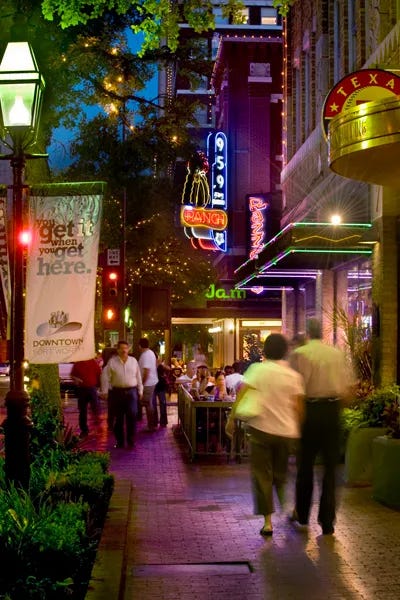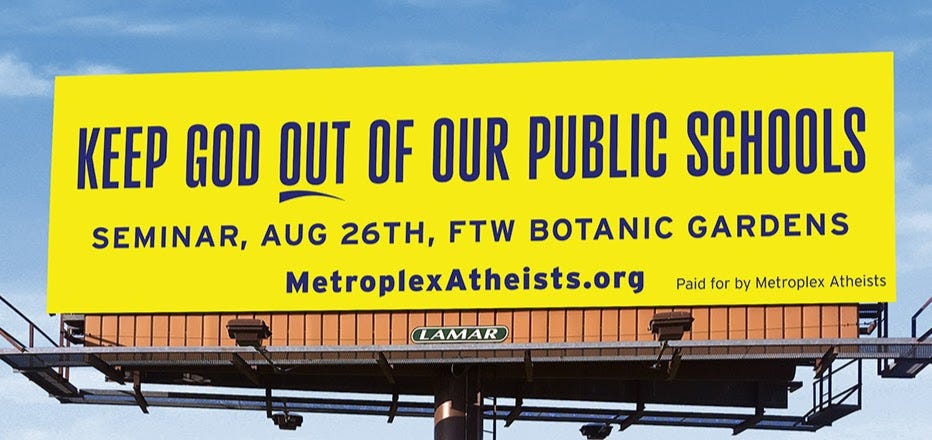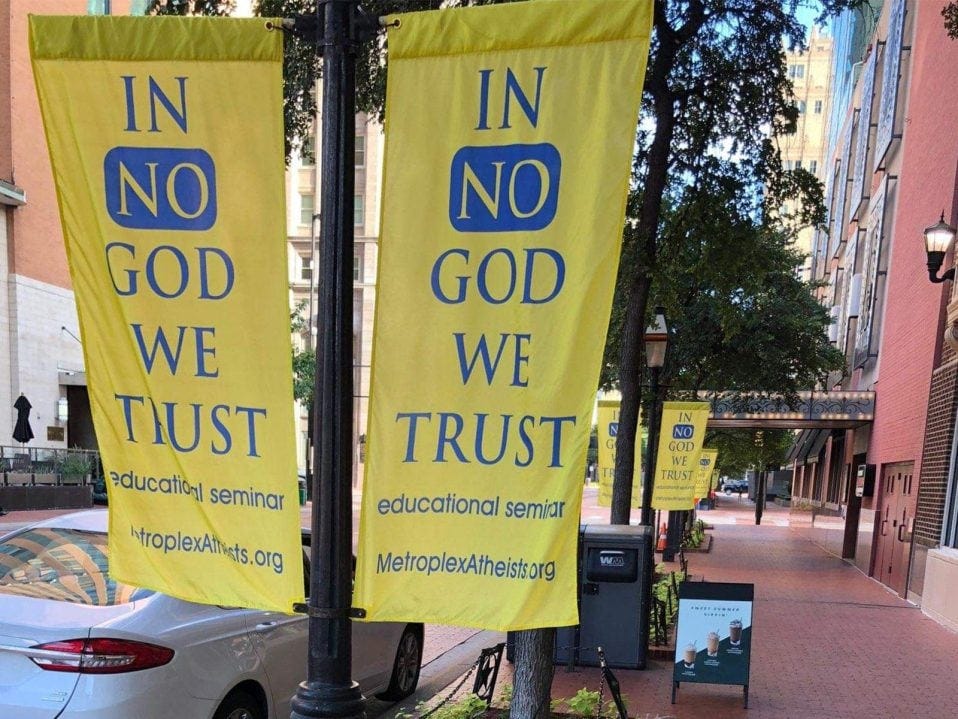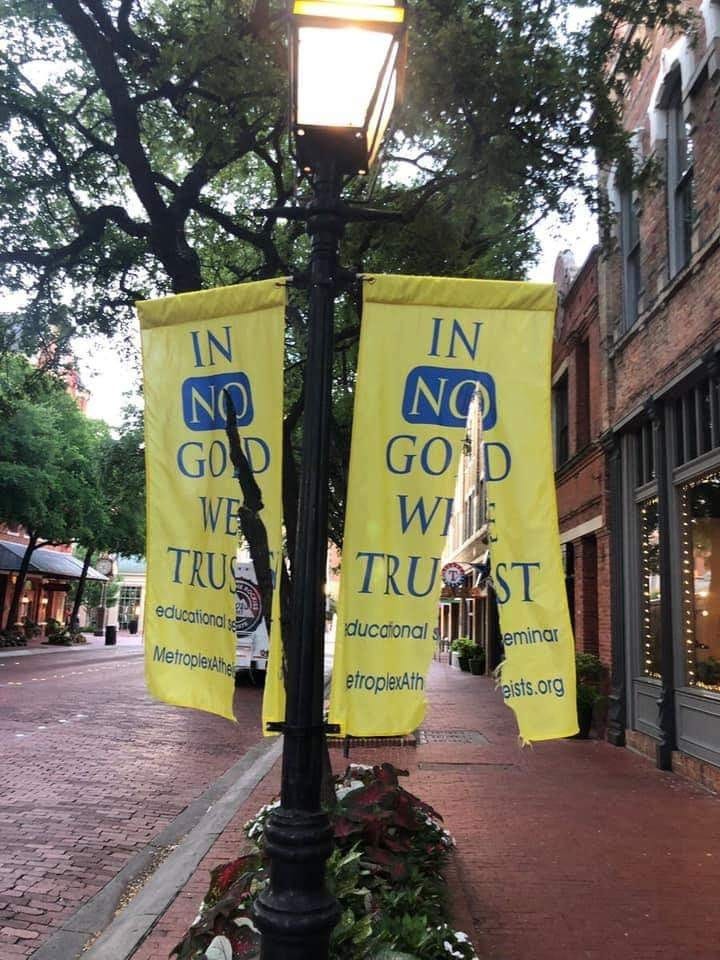Texas atheists sue Fort Worth for rejecting ads for event opposing Christian Nationalism
A city official claimed the event lacked sufficient “magnitude,” a requirement that doesn't exist
This newsletter is free, but it’s only able to sustain itself due to the support I receive from a small percentage of regular readers. Would you please consider becoming one of those supporters? You can use the button below to subscribe to Substack or use my usual Patreon page!
If you visit downtown Fort Worth, Texas, you’ll see a number of banners hanging from lamp posts advertising various local groups. The city’s rules are very specific, but in general, if you’re a registered non-profit group and you want to promote your organization or an upcoming event and you follow all the other guidelines and pay the requisite fees, you should be good to go.

And yet when the Metroplex Atheists wanted to put up banners advertising their August 26 educational seminar at the Fort Worth Botanic Garden about the dangers of Christian Nationalism—featuring professor/author Dr. Bradley Onishi, author Rev. Dr. Katie Hays, and local atheist group leader Randall Theo—the city rejected the request.
That’s especially problematic given that the city okayed a similar banner a few years ago for Kenneth Copeland Ministries to promote its “Southwest Believers Convention.” (Texas Christian University has also been allowed to put up banners advertising the school.)
Now the Metroplex Atheists (with the help of American Atheists; the American Humanist Association; and the Texas-based firm Glast, Phillips & Murray) are suing the city of Fort Worth.
“We did everything to meet the City of Fort Worth’s Banner Policy. We were denied purely on trumped-up claims nowhere in the policy, to disguise their prejudice,” said Umair Khan, President of Metroplex Atheists and a Texas assistant state director of American Atheists. “The City of Fort Worth's decision infringes upon our fundamental constitutional rights. This authoritarian and theocratic action enables Christian nationalist groups to attack the democratic rights of all citizens and our public schools–which is the focus of our seminar.”
…
“Free speech is free speech, whether or not the government likes that speech or certain members of the community object to it,” said Geoffrey T. Blackwell, Litigation Counsel at American Atheists, who wrote the complaint. “The City of Fort Worth’s attempt to silence atheists for opposing theocracy is textbook viewpoint discrimination.”
This isn’t the first time atheists have had a problem with the banner program.
In 2019, when the Metroplex Atheists wanted to advertise an event calling for a change of the national motto from “In God We Trust” to the more secular “E Pluribus Unum” (out of many, one), they were allowed to put up banners.
Two things happened that caused a stir that year. First, then-Mayor Betsy Price suggested she would’ve said no to the request if only the damn Constitution wasn’t standing in her way.
And then, days after the banners went up, they were vandalized.
All of that received a lot of news coverage at the time, but whatever complaints people had about the banners that year, no one stopped them from going up.
Yet that’s the position the city is now taking even though this year’s event is the exact same kind of seminar taking place in the exact same venue.
According to the federal lawsuit, after the Metroplex Atheists filed their completed application with Downtown Fort Worth, Inc. (the group that operates the program) in May, they were told the banners were “not in compliance” with the banner policy, which had apparently been “tweaked” since 2019. They were not told what changes had been made to the policy.
Two weeks later, Assistant City Manager William Johnson told the group that the event lacked sufficient “magnitude” for a banner hanging. There’s nothing in the city’s banner policy that says advertised events must draw certain attendance numbers. Nor is there anything that says the event has to seem important… to someone. On both counts, though, this event would almost certainly qualify. The rationale for rejecting the banners seems utterly made up.
When the atheists made a public records request for all emails involving what city officials had said about them, and all emails about changes to the banner policy, they were rebuffed.
They were eventually told the city council would review the banner policy in a closed-door session. The city soon told the atheists the denial was still in effect and that there would be a “moratorium on new banners… while the city reviews the existing policy for updates.” There was no indication that any banners other than the ones proposed by the atheists were being held up.
And since the city council doesn’t meet in July, even if the policy is reversed or modified, it may be too late for the atheists’ banners to go up in time for their event.
That’s why the atheists are calling for injunctive relief, basically asking the courts to step in and force the city to allow their banners to go up from August 8-22, since they’ve followed all the rules (at least the ones that exist in public documents).
They also want to make sure the city doesn’t categorically exclude them from putting up banners in the future and for the city to pay damages and attorney fees.
The conclusion of the lawsuit lays out the situation:
Defendants [the City of Fort Worth] acted with the intent to exclude Plaintiff from the Banner Forum because they disapproved of the banner’s anti-Christian Nationalism message. But they knew they could not do so openly and honestly without blatantly violating MA’s First Amendment rights. Instead, Defendants colluded and conspired behind closed doors to concoct a plan to exclude MA from participating in the Banner Forum without admitting they were doing so.
Defendants’ “magnitude” justification is pure pretext and any amendment of the Banner Forum to include “magnitude” as a criterion for participation in the program would have required an act of the City Council.
Onishi, the keynote speaker for the event, has already called the city’s actions a “clear violation of free speech.”
In a statement to me, Onishi elaborated:
The decision by the City of Forth Worth is troubling to say the least. It signals that those who are not in the majority do not have the same rights as others. The advertisements for the seminar do not include racist symbols or violent imagery. They are protected under the Constitution's guarantee to free speech and the basis for rejecting them is specious. We hear alot about protecting free speech when it comes to religious people. The same rights should apply to all, including the non religious, regardless of who complains to the mayor or has a temper tantrum on social media.
There’s one upside to all of this: While the claims in the lawsuit certainly point in the atheists’ favor, even if the lawsuit goes nowhere, the city is inadvertently giving the atheists far more publicity by denying them the opportunity to put up banners.
This is what happens when religious freedom really means religious privilege for Christians only.
To put that another way, Christian Nationalists tried suppressing a seminar on the dangers of Christian Nationalism, and now their plan will backfire. Hopefully.








The sense of Christian privilege and entitlement runs deep in this country, and most Christians simply cannot get their heads around the fact rights are NOT matters of majority rule. Ironically, the people who prohibited the hanging of these banners are great examples of why the meeting the atheist community is promoting is so necessary. The people who think they want God in government, always assume it will be their particular god, and no one else's.
Hopefully. some of the clearheaded citizens of Ft. Worth will get the powerhouse FFRF involved in this attempt at squashing true religious freedom/freedom from religion.